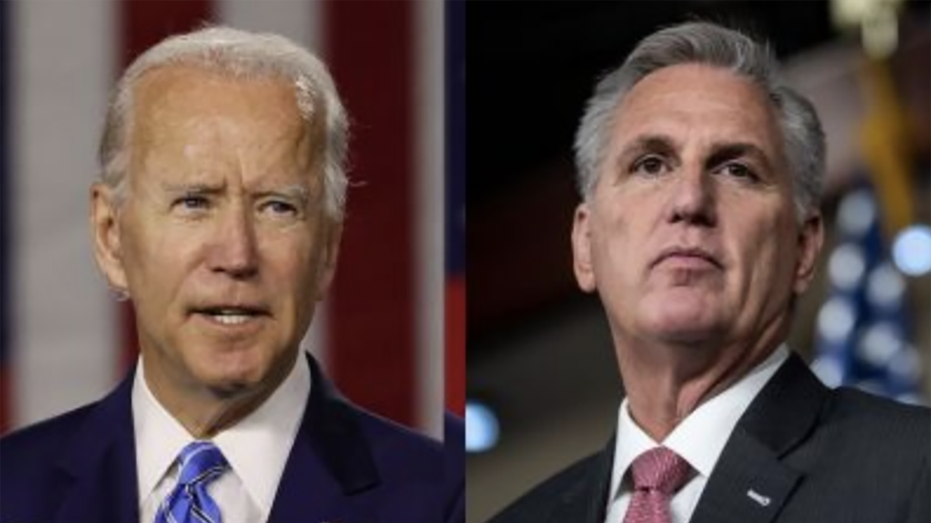How does bipartisan budget, debt limit deal impact spending, deficit?
CBO estimates Fiscal Responsibility Act will trim federal deficits more than $1.5 trillion from 2023-2033
Debt deal is largest savings in federal spending that I've seen: Burgess
Rep. Michael Burgess, R-Texas, discusses the planned House vote on the bipartisan debt deal and U.S. oil entering the world's most important benchmark.
The bipartisan budget deal reached by President Joe Biden and House Speaker Kevin McCarthy, R-Calif., in exchange for raising the debt limit until January 2025 is set to move through Congress in the next few days – just in time to prevent the federal government from defaulting on its debt as early as June 5.
As the debate has played out, lawmakers from both sides of the aisle have taken issue with the size of the spending cuts. Some fiscally conservative Republicans have argued that the spending reductions don’t go far enough while progressive Democrats have said they cut vital programs too deeply.
The deal reached by Biden and McCarthy, known as the Fiscal Responsibility Act (FRA), which reflects the partisan divide in Washington by capping discretionary spending for the next two years and outlining spending caps for the following four years, can serve as an optional guideline for the next budget and debt limit debate in early 2025.
The nonpartisan Congressional Budget Office (CBO) on Wednesday released its cost estimate of the impact of the FRA on the budget and found that if Congress and the president adhere to the two-year mandatory spending caps and carry on with the bill’s budget guidelines beyond then, the bill will reduce federal deficits by more than $1.5 trillion from 2023 to 2033.
DEBT CEILING DEAL INCLUDES NEW WORK REQUIREMENTS FOR SNAP: HOW THEY WORK

President Joe Biden, left, and House Speaker Kevin McCarthy (Chip Somodevilla/Getty Images | Kent Nishimura/Los Angeles Times / Fox News)
The charts below show how the Fiscal Responsibility Act affects federal discretionary spending and budget deficits by comparing the CBO’s cost estimate for the bill to the CBO’s budget baseline for discretionary spending and deficits:
Of the total $1.527 trillion in deficit reduction over the decade, more than $1.331 trillion is expected to come from caps on discretionary spending, which covers all the agencies and programs that Congress funds annually through the appropriations process.
BIPARTISAN BUDGET DEAL WILL LEAVE NEW CONGRESS, POSSIBLE NEW PRESIDENT FACING RENEWED BUDGET DEBATE
An additional $188 billion in savings comes from reduced costs associated with paying interest on the national debt. By reducing the size of annual budget deficits, the national debt grows more slowly, which in turn reduces the government’s interest expenses.
The Fiscal Responsibility Act also rescinds some funding that Congress had previously approved but has gone unobligated and unspent. Roughly $27 billion in budget authority is covered by the rescissions, which the CBO translates into roughly $11 billion in reduced spending over the 2023-2033 period.
BIDEN, MCCARTHY DEBT CEILING DEAL CLAWS BACK $21B IN FUNDING FROM IRS

President Joe Biden, right, and House Speaker Kevin McCarthy, left, struck a bipartisan deal over Memorial Day weekend to raise the debt limit and enact budget caps on discretionary spending. (Jacquelyn Martin/AP/Bloomberg via Getty Images / Getty Images)
One major area of federal spending is left untouched by the Fiscal Responsibility Act – mandatory spending. So-called entitlement programs like Social Security and Medicare are the largest components of the federal government’s mandatory spending.
As America’s population ages and health care costs increase, federal spending on Social Security and Medicare has risen at a faster pace than discretionary spending and is expected to continue to do so, barring reforms to those programs.
The chart below shows the CBO’s May 2023 budget baseline projections for the federal budget through 2033, including estimates for total spending – mandatory spending, discretionary spending and interest on the debt – plus tax revenues and the net deficit:
GET FOX BUSINESS ON THE GO BY CLICKING HERE
Democrats have 4 trillion reasons to vote on debt deal: Perry
Rep. Scott Perry, R-Pa., joins "Mornings with Maria" to discuss the debt deal ahead of the House's expected vote.





















